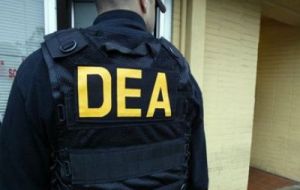MercoPress. South Atlantic News Agency
Top Bolivian officials allegedly involved in drug trafficking, according to DEA claim
 Bolivian officials were secretly indicted on drug trafficking charges as part of a DEA operation run out of the office in Paraguay, reported The Huffington Post
Bolivian officials were secretly indicted on drug trafficking charges as part of a DEA operation run out of the office in Paraguay, reported The Huffington Post Secret United States indictments obtained by the media have implicated top Bolivian officials in drug trafficking, reigniting the highly charged debate over whether Bolivia is a victim of US political persecution or whether it is becoming a corrupt narco-state.
Bolivian officials were secretly indicted on drug trafficking charges as part of a US Drug Enforcement Agency (DEA) operation run out of the agency's office in Paraguay, reported The Huffington Post. Those indicted reportedly include Walter Alvarez, a top Bolivian air force official, Raul Garcia, the father of Vice President Alvaro Garica Linera, Faustino Gimenez, an associate said to be close to the vice president, and Katy Alcoreza, described as an intelligence agent.
The news of the indictments comes a day after the White House named Bolivia as a “major illicit drug producing country” in the annual determination the president delivers to the US State Department regarding anti-narcotics priorities for the upcoming year.
Bolivia was explicitly called out in the determination for having “failed demonstrably during the previous 12 months to adhere to their obligations under international counter narcotics agreements...[.]” The memo cites Bolivia's expulsion of the DEA in 2009 and a lack of adequate controls over licit coca trade as examples of how the country has failed to meet its obligations.
Bolivian President Evo Morales' rocky relationship with US authorities has made anti-narcotics cooperation between the two countries difficult. But suggestions that Morales has totally shirked responsibility with respect to curbing the illegal drug trade have political overtones.
Since expelling the DEA, Bolivia has followed a radically different approach to the drug trade, working with coca farmers to supply legal demand for coca leaf while curbing illegal cocaine production. The policy has had notable success, with new data from the UN Office on Drugs and Crime indicating that coca production in Bolivia has reached historic lows.
In addition, rather than shunning all international partners, Bolivia has entered bilateral anti-drug cooperation agreements with Peru in 2013 and with Colombia in 2015 and secured European Union anti-narcotics funding.
However, over that time Bolivia has also struggled to tackling the trafficking side of the trade and has emerged as a prominent drug trafficking hub and potential haven for transnational organized crime. This has been facilitated by official corruption, including at high levels. The most recent example of this was former police chief Oscar Nina, who was arrested in March 2015 on allegations that he was involved in a drug trafficking ring connected to the Sinaloa Cartel in Mexico.




Top Comments
Disclaimer & comment rules-

Read all commentsBolivia, Ecuador, Venezuela and of course don't forget Argentina...the four chums.
Sep 19th, 2015 - 11:36 am 0Commenting for this story is now closed.
If you have a Facebook account, become a fan and comment on our Facebook Page!